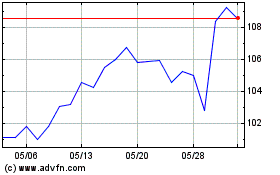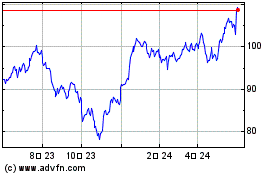Form FWP - Filing under Securities Act Rules 163/433 of free writing prospectuses
2024年11月7日 - 4:52AM
Edgar (US Regulatory)
 |
|
 |
Enhanced Return Buffer Notes
Linked to the S&P 500 Market Agility 10 TCA 0.5% Decrement Index
Due November 17, 2026
|
| · | Enhanced Return Potential — If the Final Underlier Value is greater than the Initial Underlier Value, at maturity, investors
will receive a return equal to 140% of the Underlier Return. |
| · | Contingent Return of Principal at Maturity — If the Final Underlier Value is less than or equal to the Initial Underlier
Value, but is greater than or equal to the Buffer Value, at maturity, investors will receive the principal amount of their Notes. If the
Final Underlier Value is less than the Buffer Value, at maturity, investors will lose 1% of the principal amount of their Notes for each
1% that the Final Underlier Value is less than the Initial Underlier Value in excess of the Buffer Percentage. |
| KEY TERMS |
| Issuer: |
Royal Bank of Canada (“RBC”) |
| CUSIP: |
78017GXD8 |
| Underlier: |
The S&P 500 Market Agility 10 TCA 0.5% Decrement Index (Bloomberg symbol “SPMKTD”) |
| Trade Date: |
November 12, 2024 |
| Issue Date: |
November 15, 2024 |
| Valuation Date: |
November 12, 2026 |
| Maturity Date: |
November 17, 2026 |
| Payment at Maturity: |
Investors will receive on the Maturity
Date per $1,000 principal amount of Notes:
· If
the Final Underlier Value is greater than the Initial Underlier Value, an amount equal to:
$1,000
+ ($1,000 × Underlier Return × Participation Rate)
· If
the Final Underlier Value is less than or equal to the Initial Underlier Value, but is greater than or equal to
the Buffer Value: $1,000
· If
the Final Underlier Value is less than the Buffer Value, an amount equal to:
$1,000
+ [$1,000 × (Underlier Return + Buffer Percentage)]
If the Final Underlier Value is less than the Buffer
Value, you will lose some or a substantial portion of your principal amount at maturity.
|
| Participation Rate: |
140% |
| Buffer Percentage: |
10% |
| Buffer Value: |
90% of the Initial Underlier Value |
| Underlier Return: |
Final Underlier Value – Initial Underlier Value
Initial Underlier Value |
| Initial Underlier Value: |
The closing value of the Underlier on the Trade Date |
| Final Underlier Value: |
The closing value of the Underlier on the Valuation Date |
― Underlier Performance ―
Note Performance

This document provides a summary of the terms of the
Notes. Investors should carefully review the accompanying preliminary pricing supplement, product supplement, index supplement, prospectus
supplement and prospectus, as well as “Selected Risk Considerations” below, before making a decision to invest in the Notes:
https://www.sec.gov/Archives/edgar/data/1000275/000095010324016035/dp220456_424b2-us1852mktd.htm
The initial estimated value of the Notes determined
by us as of the Trade Date, which we refer to as the initial estimated value, is expected to be between $940.00 and $990.00 per $1,000
principal amount of Notes and will be less than the public offering price of the Notes. We describe the determination of the initial estimated
value in more detail in the accompanying preliminary pricing supplement.
Selected
Risk Considerations
An investment in the Notes involves significant risks.
We urge you to consult your investment, legal, tax, accounting and other advisers before you invest in the Notes. Some of the risks that
apply to an investment in the Notes are summarized below, but we urge you to read also the “Selected Risk Considerations”
section of the accompanying preliminary pricing supplement and the “Risk Factors” sections of the accompanying prospectus,
prospectus supplement, index supplement and product supplement. You should not purchase the Notes unless you understand and can bear the
risks of investing in the Notes.
| · | You May Lose a Substantial Portion of the Principal Amount at Maturity. |
| · | The Notes Do Not Pay Interest, and Your Return on the Notes May Be Lower Than the Return on a Conventional Debt Security of Comparable
Maturity. |
| · | Payments on the Notes Are Subject to Our Credit Risk, and Market Perceptions about Our Creditworthiness May Adversely Affect the Market
Value of the Notes. |
| · | Any Payment on the Notes Will Be Determined Based on the Closing Values of the Underlier on the Dates Specified. |
| · | The U.S. Federal Income Tax Consequences of an Investment in the Notes Are Uncertain. |
| · | There May Not Be an Active Trading Market for the Notes; Sales in the Secondary Market May Result in Significant Losses. |
| · | The Initial Estimated Value of the Notes Will Be Less Than the Public Offering Price. |
| · | The Initial Estimated Value of the Notes Is Only an Estimate, Calculated as of the Trade Date. |
| · | Our and Our Affiliates’ Business and Trading Activities May Create Conflicts of Interest. |
| · | RBCCM’s Role as Calculation Agent May Create Conflicts of Interest. |
| · | RBCCM Coordinated with the Index Sponsor in the Development of the Underlier and Its Sub-Indices. |
| · | You Will Not Have Any Rights to the Securities or the Futures Contracts Underlying the Sub-indices of the Underlier. |
| · | The Underlier and Its Sub-Indices Are Subject to Deductions That Will Adversely Affect Their Performance. |
| · | The Underlier Has a Limited Operating History and May Perform in Unanticipated Ways. |
| · | Any Payment on the Notes May Be Postponed and Adversely Affected by the Occurrence of a Market Disruption Event. |
| · | Adjustments to the Underlier or its Sub-indices Could Adversely Affect Any Payments on the Notes. |
| · | The Calculation of the Underlier is Based on the Performance of the S&P 500 Market Agility TCA Index (the "MA Index"),
Which Is Comprised of the S&P 500 Long/Short Risk Aware Daily Risk Control 10% TCA Excess Return Index (the "Equity Component")
and the S&P U.S. Treasury Futures Long/Short Risk Aware Daily Risk Control 10% TCA Excess Return Index (the "Fixed Income Component").
The MA Index Is Subject to a Transaction Cost, the Equity Component Is Subject to a Funding Cost and a Transaction Cost, and the Fixed
Income Component Is Subject to a Transaction Cost, In Each Case, That Will Adversely Affect the Performance of the Underlier. |
| · | Each of the Underlier, the Equity Component and the Fixed Income Component Relies on a Measure of Realized Volatility to Predict Future
Volatility and Thereby to Achieve Their Respective Volatility Targets of 10%. There Is No Assurance that the Respective Methods for Calculating
Realized Volatility Are the Best Ways to Calculate Realized Volatility or a Reliable Way to Predict Future Volatility or to Achieve the
Respective Volatility Targets. |
| · | There Is No Guarantee that the Underlier, the Equity Component or the Fixed Income Component Will Achieve Their Respective 10% Volatility
Targets. |
| · | There May Be Overexposure to the MA Index, the S&P 500 Total Return Index (the "SPXT") or a Treasury Index When the
Level of the Respective Index Is Falling or there may be Underexposure to the MA Index, the SPXT or a Treasury Index When the Level of
the Respective Index Is Rising. |
| · | The Underlier's Exposure to the MA Index, the Equity Component's Exposure to the SPXT, and the Fixed Income Component's Exposure to
the S&P 10-Year U.S. Treasury Note Futures Excess Return Index and the S&P 2-Year U.S. Treasury Note Futures Excess Return Index
(the "Treasury Indices") May Be Rebalanced into a Hypothetical Non-Interest Bearing Cash Position on Any or All Days During
the Term of the Notes. The Non-Interest Bearing Cash Position Will Not Earn Interest or a Positive Yield. |
| · | Even Though the Titles of the Equity Component and the Fixed Income Component Include the Phrase “Risk Control,” Each
Component May Decrease Significantly or Not Increase Significantly Relative to Their Respective Underlying Indices. |
| · | Controlled Volatility Does Not Mean the Underlier, the Equity Component or the Fixed Income Component Will Have Lower Volatility than
the SPXT or the Treasury Indices, respectively. |
| · | Because the Equity Component and the Fixed Income Component May Include Notional Short Positions, the Notes May Be Subject to Additional
Risks. |
| · | The Methodology for Determining the Exposure Direction of the Equity Component or the Fixed Income Component May Not Be a Reliable
Predictor of Whether the Daily Percentage Change of the SPXT or a Treasury Index, Respectively, Will Be Positive or Negative. |
| · | The Underlier, Through the Fixed Income Component, Is Linked In Part to the Performance of the Treasury Indices, Which Are Comprised
of Futures Contracts. |
| · | Negative Roll Yields Will Adversely Affect the Level of the Treasury Indices Over Time and Therefore the Payment at Maturity. |
| · | The Treasury Indices Are Excess Return Indices, Not Total Return Indices. |
| · | Owning the Notes Is Not the Same as Directly Owning the Treasuries or Futures Contract Directly or Indirectly Tracked by the Treasury
Indices. |
Royal Bank of Canada has filed a registration statement
(including a product supplement, index supplement, prospectus supplement and prospectus) with the SEC for the offering to which this document
relates. Before you invest, you should read those documents and the other documents that we have filed with the SEC for more complete
information about us and this offering. You may get these documents for free by visiting EDGAR on the SEC website at www.sec.gov. Alternatively,
we, any agent or any dealer participating in this offering will arrange to send you those documents if you so request by calling toll-free
at 1-877-688-2301.
As used in this document, “Royal Bank of Canada,”
“we,” “our” and “us” mean only Royal Bank of Canada. Capitalized terms used in this document without
definition are as defined in the accompanying preliminary pricing supplement.
Registration Statement No. 333-275898; filed pursuant
to Rule 433
Royal Bank of Canada (NYSE:RY)
過去 株価チャート
から 10 2024 まで 11 2024

Royal Bank of Canada (NYSE:RY)
過去 株価チャート
から 11 2023 まで 11 2024
